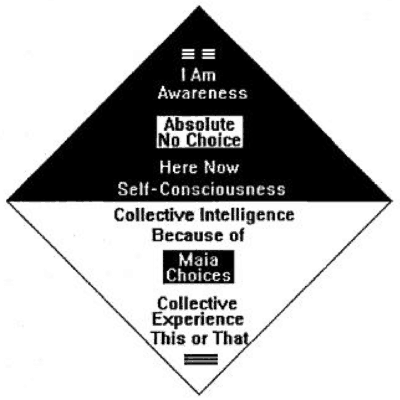No One Can Tell You How To Live Your Life, Not Even You.

If you were to ask someone if they had the ability to choose the life they want to live they may answer in a similar way as if you asked them if they were “awake”. A lot of people seem to take this question of choice as a given and wonder why you are even asking that question. If they have access to significant material resources and enjoy a privileged position in society, they might point to all of the things that they’ve done or created. Or they may believe that they can “create their own reality” through the power of intention, prayer, and manifestation. Yet, under closer inspection, this question of choice (what most people think of as “free will”) appears to start unraveling when you consider it within the whole of one’s life.
We’re constantly told by ‘experts’ and authority figures how to get the life that we see others living. If you buy their course, read their book, or follow their program you can also achieve the success and material reward they apparently have (whether they actually have is another question). But do things really work this way? If we take an honest look at our lives, our past choices and intentions and what actually happened, we can probably find more than a few instances in our relationships, health, and environment in which we’ve wanted something to be different, set an intention, and worked hard to make it so, and yet things remain just as they are.
Moreover, anyone who has seriously explored Human Design (or astrology) will eventually start wondering just what is going on here. In the same way that we do not get to choose our body and genetics, we also do not get to choose our design or birth chart. It is what it is. We can have an experience of the whole through our openness through the influences in our relationships and the planetary transits and cycles, but from the moment we are born the timing of all of these transits are predetermined. The date of your Saturn Return is fixed in time to a particular year, as well as one’s Uranus Opposition, Chiron Return and all of the other planetary transits.
When it comes to relationships, it seems like we choose who we are connected with. However, who is making that choice? Or where is that choice coming from? Is it coming from our mental ideas and stories about what kind of partner we need or is it a matter of convenience (ie. the next one that comes along)? And do we really get to choose how long a relationship lasts? We see all sorts of examples of people stuck in relationships that they can’t let go of. It seems like we have much less control over the timing of our relationships than we like to think, and anyone who has tried to change another person will ultimately question the effectiveness of that approach.
Furthermore, in the last decade or so, research studies utilizing functional magnetic resonance imaging (fMRI) and other brain-scanning technologies have increasingly been coming out showing that decisions are actually made deep in our unconscious seconds before our conscious mind becomes aware of what is happening. At that point, our conscious mind then assigns personal agency to the change or movement. In other words, there is no conscious decision-making agent actually making these choices. One recent study published in Psychological Science proposed that in the moments that we are experiencing a choice, our minds are rewriting our experience and fooling us to think that the choice was consciously made prior to the actual decision.
All of this appears to call into question the common notion of “free will” and may lead us to ask just who (or what) is making these choices. The mind only appears to be able to assign a narrative to the choice that was made but has no actual power or energy to initiate change and move the form through life. Taking all of this in may lead to a sense of helplessness as we begin to see how little we actually get to choose about our lives. And yet, it seems like the illusion of choice is built into the system or more specifically the construct of the Maia which is maintained through our mental approach to life. It points to the possibility that there may have been some evolutionary advantage in our brain’s development to maintain a perceived experience of agency or “free will” in a world more predetermined than we think. It also raises the question of whether this orientation to life is still appropriate for our current phase of human evolution.
Whatever the case, the not-self mind tenaciously holds on to the role of the “driver” and the idea that we can control our experiences according to our intentions and the decisions we make. The mind may even come up with examples of daily choice like “should I have coffee or tea” or “should I wear green or blue today”. But are these the kind of choices that really matter in our lives – and even if they did, the question remains of who or what is making these decisions? As suggested by the studies on free will, even these choices appear to be made in the deep unconscious recesses of our brains and may be more a result of past conditions and influences.
The “unconscious” that the aforementioned studies reference can be seen as the “Design” or the form in the Human Design System. The “conscious” mind is seen as the “Personality” or “what we think we are”. Strategy and Authority are put forth as a way of allowing form awareness or intelligence to become the “driver” of one’s life. Strategy offers us a correct way of engaging with life and Authority shows our unique process of coming to the truth within ourselves. For most of us, it suggests waiting until the circumstances of life are in alignment with our personal movement and truth. If you’re a Generator, you wait to respond and meet life directly through the energy of the Sacral center. Projectors wait to be invited through recognition and a specific or formal invitation. Reflectors wait and experience a flow of life through a full Lunar cycle. And while Manifestors do not have to wait for others, they may have to wait until their inner energy moves them and inform others about the potential impact of their actions.
But as much of a game-changer as experimenting with Strategy and Authority can be, they are far from what we commonly think of as “choice” or creating one’s reality. You can’t change how your Sacral responds, nor can you change your splenic instinct or the emotions you feel. The Sacral center either responds and lights up or not, the Spleen senses that something is healthy or not, and when deep in an emotional wave, it is often simply a matter of waiting until our feelings change and cycle back up in time.
Strategy and Authority are a means of moving through the Maia and awakening to oneself through the form principle. The form (body) is the life, meaning that the body exists as part of the mechanical model of the Universe. They are not separate, but the body being part of a greater whole. “Making decisions” through one’s inner Authority simply aligns your consciousness with the movement of your life. It doesn’t change your life according to what your mind thinks or wants. However, it does allow us to begin a deconditioning process where we begin to live more as ourselves and release the grasp of the not-self mind over our lives. As we continue to decondition and let go of all of the things that we are not, the mind can only watch and witness our life as it happens. While sounding like a passive approach to life, it can actually be quite powerful to align with one’s form consciousness through Strategy and Authority, and often requires something of a leap of faith in order to trust in life itself.
Our minds will struggle to understand and make sense of how we are supposed to move through life without mental decision-making. Or our minds may take hold of this “no choice” concept and try to use it as an excuse to do nothing and fall into a state of despair or hopelessness. But that’s usually just another way that the mind tries to re-assert control over the life. It’s about accepting what is and witnessing the unfolding of our life as it happens. As unfamiliar and uncomfortable this orientation to life might be for some people, the reality is often that there is nothing to do until there is actually something to do. Then we can surrender to our inner authority and flow with the movement of our life and see what it has in store for us.
All of this leads to what might be called a “wait and see” approach to living and what Ra Uru Hu often described as “entertainment” or “watching the movie”, gracefully enjoying the experience of our life as it is, not as we necessarily want it to be. It’s an act of surrender to the joy and the sorrow, the pleasure and the pain. Loving ourselves and the life we are here to have. And knowing that at the end of it, we lived and played the role fully. Not someone else’s life, but your own unique life, story, and purpose for being here.
 Vanity. Vanity. Everything is Vanity, said Salomon. It is the greatest of truths and it is a particularly Human condition. On the assumption that the individual is in control of its destiny lies all suffering. It has a name. It is called free will. It is an illusion. All of the great teachers have taught over and over again the same lessons, that in their language, only God is great. They had no proof and their wisdom either found belief or rejection. The Human Design System is an absolute, an ‘Absolute of the Maia’. It is evidence, living evidence that there is no choice, that there is no free will. There should be no confusion about this no choice. It is not a concept. It is a fact. Close your eyes and remember that you are traveling at hundreds of thousands of kilometers an hour in space, literally hurtling through the cosmos. We are being penetrated by trillions of particles, Neutrinos, that have been proven to bear mass; traveling at near the speed of light every second. If you take an electron microscope and look into a Human body at a high enough magnification, there’s nothing there but empty space. In biology, ‘everything’ that you think and say and do, ‘everything’ is initiated in the deep grey areas of the brain before they are consciously perceived. There is no choice. It is a fact … and yet the power of choices prevails.Ra Uru Hu
Vanity. Vanity. Everything is Vanity, said Salomon. It is the greatest of truths and it is a particularly Human condition. On the assumption that the individual is in control of its destiny lies all suffering. It has a name. It is called free will. It is an illusion. All of the great teachers have taught over and over again the same lessons, that in their language, only God is great. They had no proof and their wisdom either found belief or rejection. The Human Design System is an absolute, an ‘Absolute of the Maia’. It is evidence, living evidence that there is no choice, that there is no free will. There should be no confusion about this no choice. It is not a concept. It is a fact. Close your eyes and remember that you are traveling at hundreds of thousands of kilometers an hour in space, literally hurtling through the cosmos. We are being penetrated by trillions of particles, Neutrinos, that have been proven to bear mass; traveling at near the speed of light every second. If you take an electron microscope and look into a Human body at a high enough magnification, there’s nothing there but empty space. In biology, ‘everything’ that you think and say and do, ‘everything’ is initiated in the deep grey areas of the brain before they are consciously perceived. There is no choice. It is a fact … and yet the power of choices prevails.Ra Uru Hu
